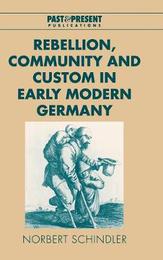
|
Rebellion, Community and Custom in Early Modern Germany
Hardback
Main Details
| Title |
Rebellion, Community and Custom in Early Modern Germany
|
| Authors and Contributors |
By (author) Norbert Schindler
|
|
Translated by Pamela E. Selwyn
|
| Series | Past and Present Publications |
|---|
| Physical Properties |
| Format:Hardback | | Pages:328 | | Dimensions(mm): Height 236,Width 161 |
|
| Category/Genre | World history - c 1500 to c 1750 |
|---|
| ISBN/Barcode |
9780521650106
|
| Classifications | Dewey:943 |
|---|
| Audience | | Professional & Vocational | |
|---|
| Illustrations |
1 Maps; 10 Halftones, unspecified
|
|
Publishing Details |
| Publisher |
Cambridge University Press
|
| Imprint |
Cambridge University Press
|
| Publication Date |
17 October 2002 |
| Publication Country |
United Kingdom
|
Description
When this volume first appeared in German it inspired a whole generation of young scholars. Schindler recreates the lives of both the poor and excluded; the milieu of the burghers; and the rumbustuous lifestyles of the Counts von Zimmern. A true archivist, he evokes the lost worlds of sixteenth- and seventeenth-century people. He investigates popular nicknames, snowball fights, carnival rituals, even what people did at night-time before the advent of lighting. A final essay deals with an extraordinary late set of trials for witchcraft, in which over 200 people died. Translated into English for the first time, the volume contains a new Foreword by Natalie Zemon Davis and a new introductory essay setting out the key influences of Schindler's work. Norbert Schindler is the leading exponent of historical anthropology in the German-speaking world. A founding member of the German journal Historische Anthropologie, Schindler teaches at the University of Salzburg.
Author Biography
Professor Norbert Schindler was born in 1950 in Chieming, Bavaria, and is the author of many influential books on popular culture in the early modern period. He has taught at University institutions in Berlin, Konstanz, Innsbruck, Basel, and Salzburg.
Reviews'Schindler enjoins his readers to look at the past with fresh eyes and to think of and savor its strangeness. His portrait of the multiple practices of the men and women of the artisanal, peasant, and poor classes in the early modern period - their expressiveness, inventiveness, economy, humor, cruelty, helpfulness, and frankness - helps us understand that strangeness in a new way.' Natalie Zemon Davis '... contains ground-breaking research ... In his book Schindler lists such 16th and 17th-century folk activities as the adoption of nicknames, snow fighting, carnival rites and social inversion, marriage customs, the nocturnal habits of the peasantry and the role of the wandering beggar in German witchcraft. Recommended.' The Cauldron '... stimulating and worth reading.' Journal of Ecclesiastical History 'The series of Past and Present Publications produced by Cambridge University Press has already brought the work of some of the most innovative early modern Germanists to the English-speaking audience. This latest volume is no exception ... The book succeeds on several levels ... Rich in empirical detail ... valuable contributions to a field that, internationally, is still dominated by Anglo- and Francophone scholars.' European Review of History '... packed with such dense detail, such a vivid evocation of early modern German life and such a plethora of inspiring ideas that it should be read and re-read by all social and cultural historians of early modern Europe.' Journal of Continuity and Change '... [Schindler] seeks to understand the violence of the past as much as possible on its own terms with attempts to explore the ways in which it made sense to its protagonists.' Historical Journal
|